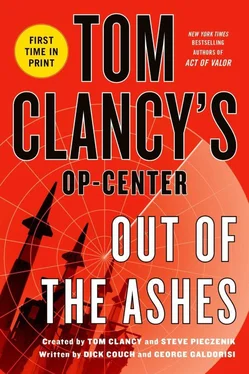“Our entire intelligence and national security communities seem to agree on but one issue: No one agency is at fault. So, by that, I’ve had to conclude they all are at fault. These attacks go well beyond any failures by a single individual or institution, and there’s more to this than just failing to connect the dots.” Midkiff paused for emphasis. “And God knows, Congress has raked me and my national security leadership over the coals over these attacks. And they may be right. If no one failed to do their job, and if the system doesn’t work, then I am to blame. I’m the president, and so it’s up to me to get it fixed. It seems we just didn’t have the … have the … how do you phrase it, Trevor?”
“We didn’t have the predictive intelligence and the ops-intel fusion, Mr. President.”
“Ah, thank you. Yes, terms I’ve become increasingly familiar with over the past several weeks. Do you agree with me thus far, Paul?”
“Absolutely, Mr. President.”
“And I think, as Trevor and my director of national intelligence have suggested, while our systems may have worked in the past, they didn’t work fast enough to stop these recent attacks. We’ve got large, capable organizations staffed by hardworking professionals doing their best to ensure our national security. Yet they all have their limits, to say nothing of their statutory and legal frameworks. Have I put this about right, Trevor?”
“Yes, Mr. President.”
“So I think we generally agree we need something new, and someone I can call on when the normal instruments of national security can’t move fast enough or in the right legal channels to get the job done. We probably need a more alert, anticipatory, and predictive system that can see these things coming so we have the time to take action. I think that’s where you come in, Paul.”
“I’m at your service, Mr. President.”
“Thank you. The national security advisor and I have reviewed the Op-Center file and discussed the possibility of reestablishing Op-Center, or something like Op-Center. I think we are of the opinion that if Op-Center had been around these attacks might have been prevented. Of course, we’ll never know for sure, and hindsight is always twenty-twenty, but we are of a mind to consider standing up an Op-Center-like organization.”
Midkiff paused and measured Hood carefully. “In addition to reviewing the file, I’ve had my staff give me a crash course on Op-Center’s history and especially its past successes. As you probably know, in my years in the Senate, national security wasn’t my primary focus, so I really didn’t fully know what you and your organization accomplished over those years. Now I feel I’m at least a bit caught up. If we believe it might be advisable to re-create an Op-Center organization, how should we move forward?”
The three men embarked on an earnest discussion focused on reestablishing Op-Center to deal with just the sort of between-the-seams challenges and intelligence shortcomings that had failed to anticipate and prevent the attacks on the NFL stadiums. The men agreed it was the right thing to do.
The president was of a mind-set, and Paul Hood found it difficult to disagree, the new Op-Center would need to have a new look and function differently than the old one. The objectives of its operation would remain the same: It had to take on issues and challenges no other agency or agencies could, but there would be substantial differences. These differences had to do with speed and execution. The goal was the same: to protect American citizens at home as well as American interests around the world. The men discussed a host of details, and after almost an hour of intense discussion, they had resolved most of the hard spots and agreed in principle on their plan.
“So, Paul, the next question is who should lead Op-Center? As you might imagine, this is a huge assignment, and having the right Op-Center director stand it up again can make or break our efforts. We have discussed this in great detail here, and I think — we think — you’re the right man for this assignment.”
There was a long pause, and the president could see Paul Hood was struggling with what he was about to say.
“Mr. President, I’m honored, first of all, by your commitment to reestablish Op-Center, and second, by the high honor of offering me this position.” Hood was silent for several moments. Finally, and a bit abruptly, he said, “Sir, may we have a moment alone?”
Trevor Harward had been around the block, and he saw Wyatt Midkiff was struggling with how to respond. He offered a way out. “Mr. President, we’re running a bit over time, so I’ll just step out and ask your secretary to adjust your calendar.”
“Yes, Trevor, thank you.”
When the door closed, the president stared at Paul Hood.
“Paul?”
“Mr. President, again, I am honored by your confidence in me. However, I cannot accept this assignment.”
“Paul, I’m not offering this to you to make you feel good. Believe me, we discussed this at length before you arrived. My national security advisor and I have vetted several potential candidates, and I assure you that you are our consensus choice. We need you, Paul.”
There was again a long silence before Hood continued. “Mr. President, I would like to do this, believe me. Unfortunately, I’m afraid I’ve recently been diagnosed with amyotrophic lateral sclerosis.”
Now it was Midkiff’s turn to pause as he digested what Hood had just told him. ALS — or Lou Gehrig’s disease — had no cure, and people with this condition deteriorated rapidly and often quite dramatically. “Oh, Paul, I am so sorry!”
“Thank you, Mr. President. At the moment I seem to be doing just fine, but there’s just too much at stake if I’m not a hundred percent tomorrow, next week, or a month from now. As I suspect you might know — and trust me, Mr. President, I now know vastly more about this condition than I ever wanted to know — the problems arise when your physical abilities begin to degrade. The difficulty is, they degrade rapidly and often unpredictably. I’m afraid I need to give this condition my full attention.”
The president searched for something soothing to say. “Paul, perhaps you could just get things moving, gather a strong cast around you, and then hand over the reins to someone else later.”
“Thank you, Mr. President, but as I said, there’s too much at stake here, and right now my attention is on coping with this condition as best I can.”
The president paused again. “Paul, I know you’re a patriot; this difficult decision you’ve just made only confirms that. If there were any way that you thought you could do this, I know you would. So I respect your decision.”
“Thank you, Mr. President.”
“But to be honest with you, we were counting on you doing this. I don’t know how else to ask this, but if not you, who?”
“Mr. President, I hope you don’t think this is too forward of me, but I may have just the right man for this assignment. And he’s right across the street waiting in the Eisenhower Executive Office Building. Do you have time to meet him right now?”
Wyatt Midkiff sat back and considered for a long moment the need to move and move quickly, Paul Hood’s condition, and the nation’s vulnerabilities. Then he stood up, walked to his desk, and punched the button on his phone that connected him to his secretary.
“Alice, clear my calendar for the rest of the afternoon and ask Mr. Harward to come back in here.”
The president turned back to Hood. “All right, then, Paul, let’s meet your man.”
“I’ll have him here in a moment, Mr. President.”
* * *
Trevor Harward rejoined the president and Paul Hood. Midkiff sought to skate around the issue of Hood’s condition, but he would have none of that. He restated the reasons for his inability to serve and moved on to his nominee for Op-Center director. Hood assured both men the individual he had sought out was eminently and uniquely qualified to lead a reconstituted Op-Center. He handed the president and Harward a brief biographical sketch. They discussed the Op-Center designee’s qualifications, and neither the president nor his national security advisor could fault Hood’s logic, or the man’s qualifications.
Читать дальше












